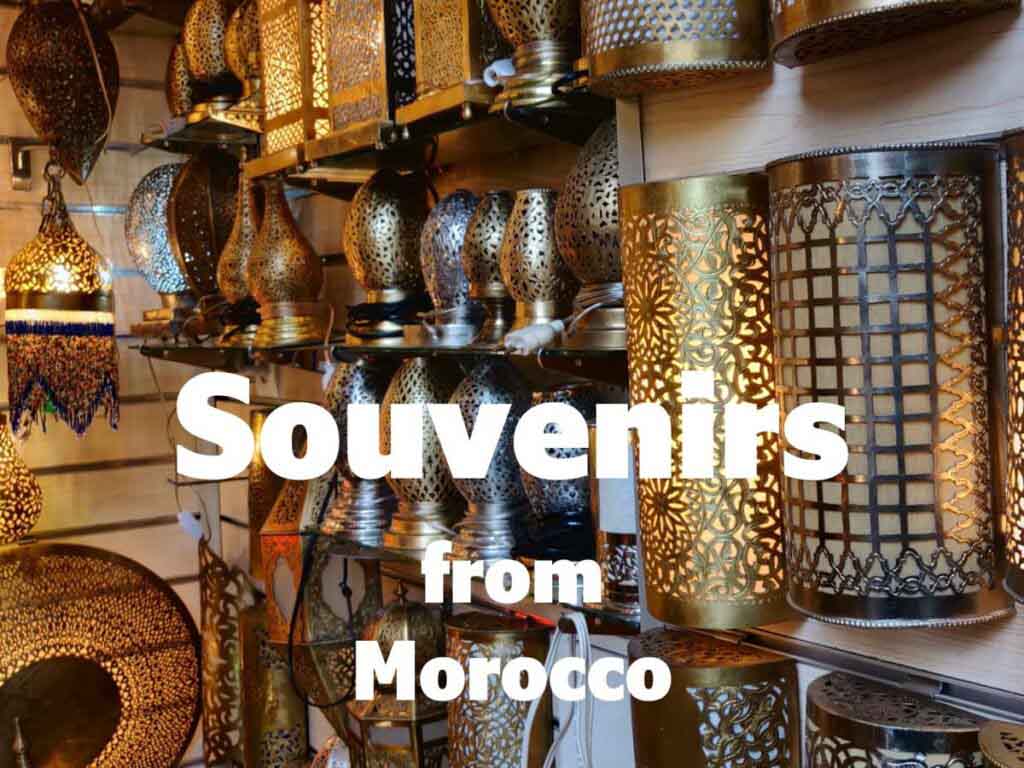What’s the situation of women in Morocco, you ask?
A lot of people who visit Morocco wonder about the situation of the women here. There are many prejudices, and I’m sure some of them are true. But there is always more going on behind the scenes, things that stay hidden from the tourists visiting this beautiful country.
Living here gives me more opportunities to look behind the curtain and see what’s really going on. Of course, I can only write about what I’ve seen and heard since I moved here. And I’m sure, there is much more going on than they will let me see.
If you are looking for info about solo female travellers in Morocco, read this.
The official status of women in Morocco
Officially, the women in Morocco have equal rights since 2004. They can get divorced and don’t have to accept polygamy anymore.
Polygamy is still allowed. But the first wife has to agree to it and the husband has to prove sufficient funds to support another wife and more children. So, it has become rather uncommon.

In the big cities, it seems like women are very independent. They study, have good jobs, the younger ones often wear modern clothes. But once you head into the rural areas, you will not find many, if any, women not covering their hair or wearing pants.
Traditional gender roles in Morocco
In the countryside, especially in the desert and mountains, life is still very conservative. A lot of women my age don’t know how to read or write. They haven’t been to school. And they only speak their local Berber language. And the “only” work they do is keep the house, watch the children, bake bread and grow vegetables in the garden.
Which means they are often much busier than their husbands, who might have a shop or restaurant and sit around drinking tea most of the day. But, it is still expected that the husband provides and brings the money home.
My feeling is though, once the money is there, the woman is the one watching over it. She runs the household and makes sure all needs are taken care of.

There are of course exceptions, where the village women also make some money. Here in Merzouga, a few women sell bread to the small shops in town. Some make and sell the traditional headscarves of the local berber style.
And I know a couple of women who work as seamstresses, making dresses for lots of the other women. I first met one of them when I was looking for someone to sew cloth masks for me when the pandemic reached Morocco. By now, she has also made me half of my summer wardrobe.
In the more remote villages, a lot of women weave carpets and rugs and sell them in associations and cooperatives.
Traditional clothing of the women in Morocco
It is a mystery to me how the women here survive the summer in all the layers of clothes they wear. No matter how hot, they will wear some pants or leggings, sometimes multiple layers. Undershirt, shirt with short or long sleeves, and a long dress. And then a headscarf plus a shawl of some sort on top, sometimes covering them from head to toe.
These shawls differ in colour and style by region in Morocco and the locals can tell where the women are from just by this. My favourites are the really colourful ones from the southern desert villages.
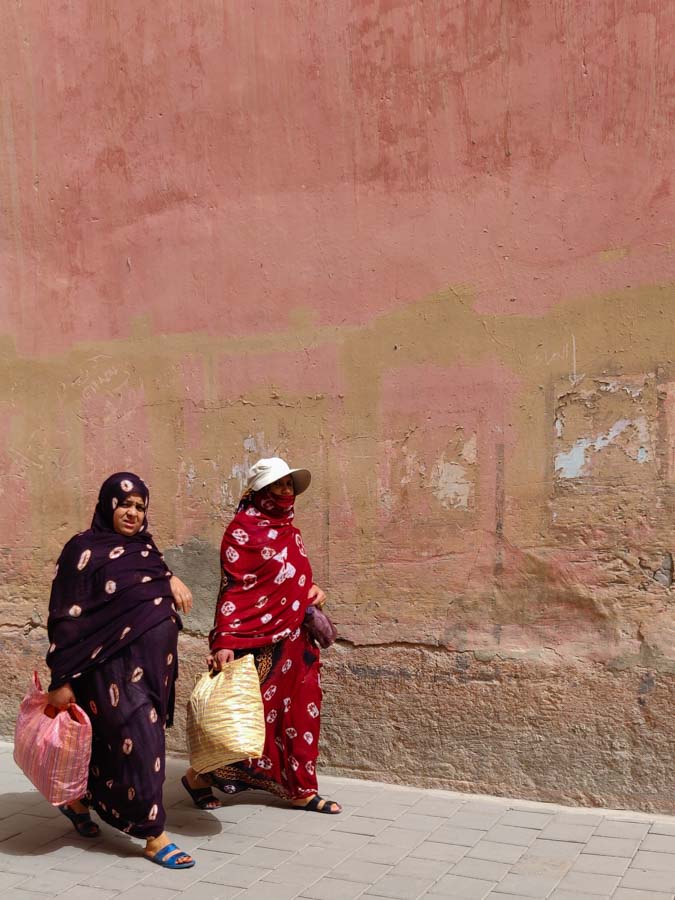
The “underlayers” would mostly be considered pyjamas in western countries I think. There is a lot of velvety fabric in all different colours and patterns and the odd Mickey Mouse or Hello Kitty involved. And a lot of people here seem to sleep in their day clothes. Kids just drop on some blanket when they’re tired, fully dressed, and from what I’ve seen lots of grown-ups do the same.
Sometimes I am a little jealous of this style, as it makes travelling light very easy. But on the other hand, I love putting on freshly washed clothes after my shower every morning. And I find sleeping in my normal clothes rather uncomfortable.
Home life of women in rural Morocco
When women in Morocco get married, it is expected they move in with their new in-laws. Depending on the situation, this can mean into the actual house of their father-in-law, or into a separate house within the family compound. If a family has many sons, this can mean quite a big and busy household.
Children are expected to help around the house, much more so than in Europe for example. The girls mostly help in the kitchen, with cleaning and the laundry, the boys around the garden and with fixing things. All in all, pretty stereotypical. Life for mothers of only sons is pretty tough, since the sons will not help with the normal household chores at all.
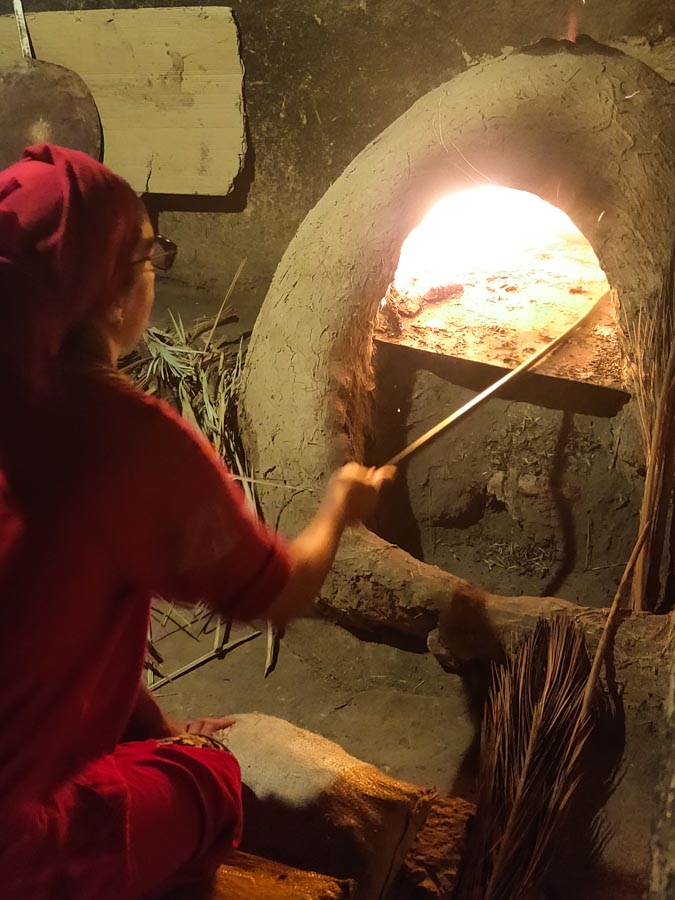
Families with only girls are under a lot of financial pressure. They still have to pay a dowry for their daughters’ weddings. And they will not have any help around the house after all daughters got married, since they will move in with their respective husbands’ families. But, the husband’s family pays a dowry to make up for the loss of help in the household.
Baby parties
When a baby is born the mother stays in bed for the first weeks and is tended to by female family members. A lot of women come to visit and bring either gifts or money. On the 7th day, there will be a celebration, a sheep will be slaughtered, and many guests will come and in the case of a son, he will be circumcised on this day. The father names the baby on this day, as is tradition. I was invited to one of those events recently, a very interesting experience.
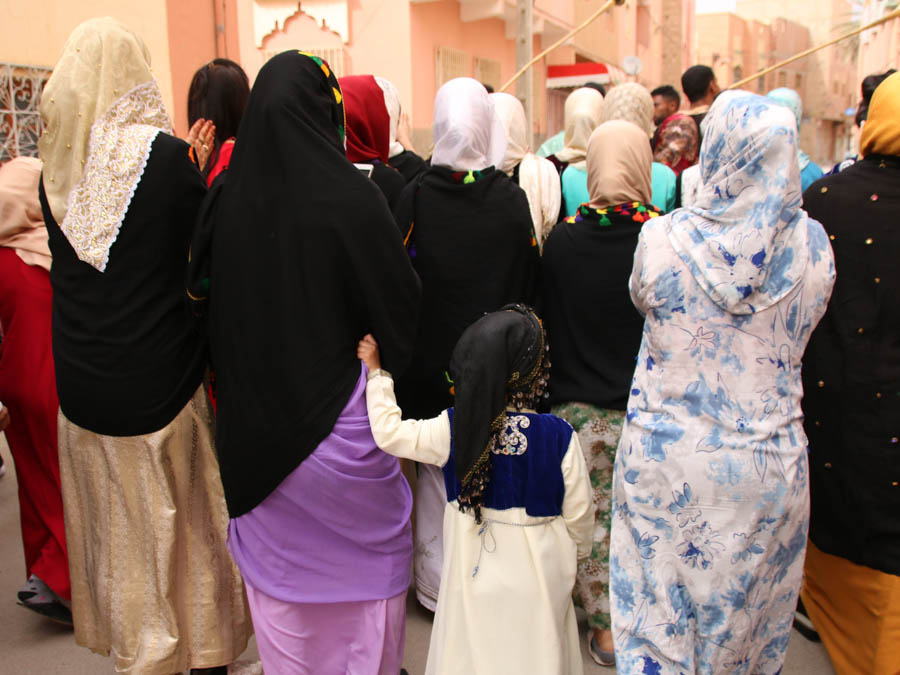
Traditionally the father invites a lot of male friends for lunch. They will sit in the living room and get served course after course of sheep meat dishes.
The women spend most of the day cooking and serving food. The female visitors come for tea in the afternoon.
The decision for the baby’s name seems to lie solely with the father. In my friend’s family’s case, the women had “voted” for one name, but were completely ignored and the baby was given a different name.
Having guests
Here in Merzouga, men and women don’t mix unless it’s within their own family. And even then, if numbers are big enough, there will be a men’s table for dinner, and another for women and children.
When there are male visitors, the men usually host, and the women and children “disappear” into the kitchen or another room.
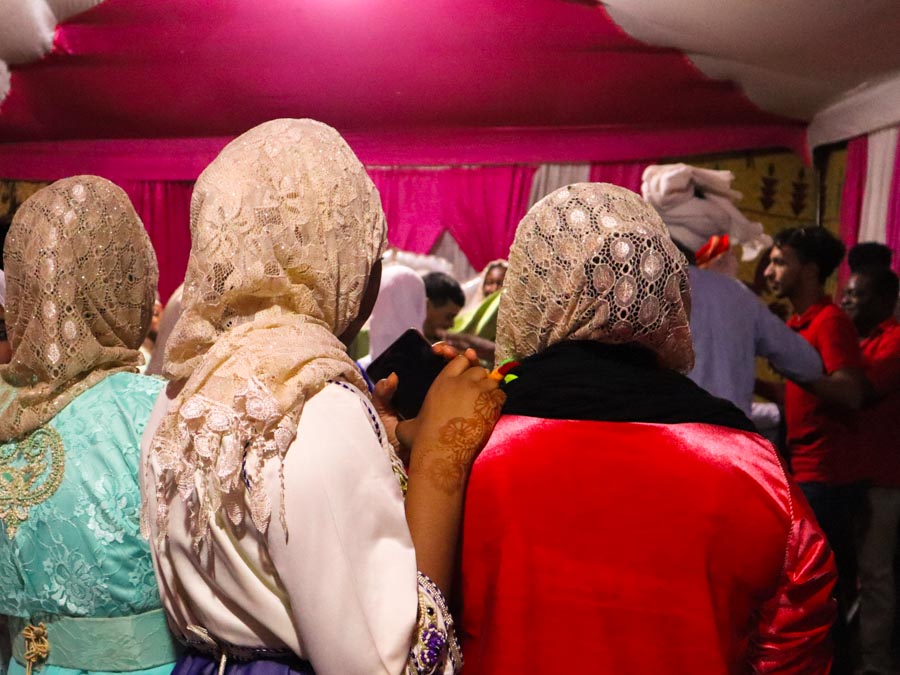
When there are female visitors, the men usually leave the house to give the women some privacy. And as visitors usually show up completely unannounced, this can cause some inconveniences. But apparently, you don’t say no to visitors ever, no matter how bad the timing.
I still find this part fairly difficult. At home you would never just come over at lunch or dinner time. You get invited, or you don’t go. Here, there are no invitations.

My partner’s sister-in-law is one of my few friends here in Merzouga and I seem to have a standing invitation in her house. If I’m there, I’m expected to eat there. If I walk by at mealtime, I’m expected to come in and eat with them. To me, that sometimes feels like I am taking advantage of her generosity.
But, especially during the summer, I don’t feel like eating the Moroccan food, which to me feels too heavy when it’s hot. So, I sometimes declined and went home instead. And then I feel like I am insulting her hospitality or her cooking.
So either way, I kind of feel bad. And I am not sure how to find out where the line is. My poor language skills still prevent that kind of conversation.
The traditional role of girls at home in Morocco
The girls are expected to help around the house from an early age, and I hardly ever heard one of them complaining. They learn how to bake all kinds of breads, cook tajine and couscous and help clean.
Also, it seems to be the norm to have the girls serve on the older women and the men of any age. The boys sit on the couch watching TV and call one of the girls doing her homework to go fetch them some water. Sometimes my boyfriend asks me if I want tea or cookies. And when I say yes, he calls one of his nieces to bring me some. He would never consider going to get them himself.
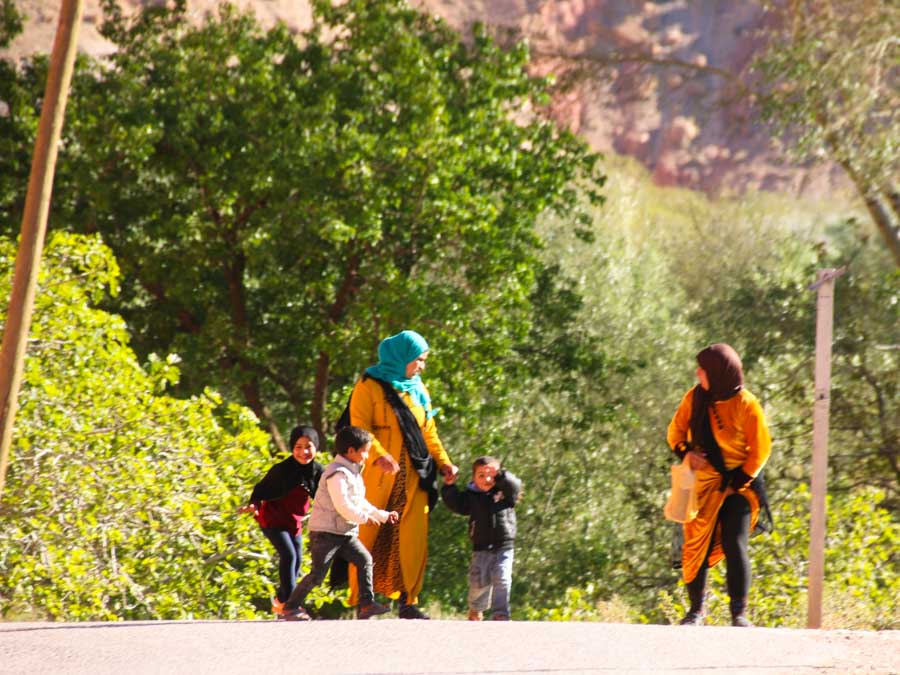
Babies are carried around on their mothers’s backs until way after they start walking. I always find it surprising how relaxed those kids are. They don’t whine and cry much, even if mom is sitting around with others, having tea and talking for an hour. Or on 10 hour bus rides. It’s hard to imagine this with German kids.
Once they are a bit older, the older siblings, mostly the sisters, watch over them. They take them out to play and make sure they don’t run onto the roads.
By the time the girls are grown up and get married, they know how to be a “good wife” and mother.
Gender separation at weddings in Morocco
At weddings, the guests are usually separated by gender. There is a tent for the women to gather (so they are a bit more protected from onlookers), where they will sing, dance and eat together.

The men either have a different tent or somewhere outside to sit together. They only all come together for the more ceremonial parts of the wedding, which usually is celebrated for a total of three days. And nights.
I have a different status than the local women though. I can actually choose to sit with the men if I wanted to. Which sometimes I do, because it means I have people to talk to in English. At the same time, I feel like I should join the women as much as possible. One reason is out of respect for their culture, and another is, I might actually learn to speak more Tashlaheit (the local Berber language) if I did.
Education of women in Morocco
It is good to see that a lot of families are trying to change life for the better for the younger generations. They send their daughters to school and university, even if this means relocating the whole family to a city far away from their home.

The downside of this is of course, that the villages are slowly “dying”. Families moving away in search of better education and jobs, leaving only the older generations behind.
A lot of girls here go to technical colleges and universities and study engineering or IT, much more so than in Europe. There doesn’t seem to be any prejudice against women in technical fields here. At least in Germany women still have to fight for equality in school and work-life in those disciplines.
Since people here still see education, especially for girls, as a privilege (something that got lost in most of the western world I think), they are very disciplined and hard working.

A couple of months before Corona shut everything down, a new women’s association was started in Merzouga. One of the women approached my boyfriend to ask if maybe I want to help them out. Which is a great compliment for me because it shows they respect me and do not see me as a “stupid tourist”.
Teaching English to girls and women in Merzouga
So, I offered to teach English to the girls and women and asked if they will in return teach me their language. I wasn’t sure if there would be any interest in English lessons. But more than 20 girls showed up for the first classes. I ended up splitting them into 2 groups by age, because the older ones learn so much faster.
It is quite funny actually. Most days when I gave a class, there was a group of boys, trying to see what we were doing in the classroom. They wanted to come learn English too. But I think it’s nice for the girls to have one thing the boys can’t have. Especially as the classes are already too full as it is.
The “invisible” women of Merzouga

If you sit in a café on Merzouga’s main street, you will hardly see any of the local women. For months I wondered if they all live in other parts of town or sit in the house all day. But no, they just mostly stay hidden between and behind the houses in little alleys. They meet up to bake bread together, visit each other for tea or just sit in the shade and talk. Unless it is Friday afternoon, which is when they all come out to go to the weekly souk.
I hope this gives you an impression on the life of a Moroccan woman in the villages. Even if for all official matters women have equal rights, in my opinion, there is still quite a way to go until women are actually seen and treated as equals in Morocco. Especially in the rural areas.
Is my blog helping you?
Maybe you want to thank me by inviting me for a coffee!
You prefer to let others do the planning? I offer itinerary planning for your trip to Morocco! You can check out the details here.


